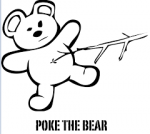Following a couple of old links brought me back to this thread from last year.Remember it. It was part of my introduction to the game.
Still run one off mega dungeon crawls with these same GMing principles almost wholly intact. For that play agenda, they have withstood the test of time.
A high degree of proficiency in GMing this style and in playing this style provides a rewarding experience for both sides of the table. A low degree of proficiency in GMing results in poorly conveyed information, loss of player agency and skill as arbiter of outcomes, and/or pear-shaped crawling dynamics (such as poorly considered rewards inflating PC potency for the rest of crawl). A low degree of PC proficiency can result in early TPK and/or indecision that stalls the game due to the high stakes.
Rereading this particular post reminded me of some things Luke Crane said about running Moldvay Basic.
On player proficiency and TPKs:
The players duly raided away, but after the third wave of character deaths, they had a dawning realization that this endeavor was pointless. They quit Quasqueton after exploring 80% of the dungeon in three sessions, at the cost of about six deaths: They vowed never to go back. . . .
Why is this era of D&D about puzzle-solving and exploration? Because your characters are fragile and treasure compromises 4/5s of the experience you earn, whereas fighting monsters earns only 1/5. Thus if there's a big monster guarding a valuable piece of treasure, the incentive is to figure out a way to get the treasure without fighting the monster. Fight only as a last resort; explore first so you can better solve. This shift in emphasis away from fighting was frustrating at first, but then profoundly refreshing once we sussed out the logic. . . .
Having learned this lesson at the cost of another seven deaths, the group completed B2 in grand style: Their plans were so effective, their exploration so thorough, that the victorious player characters suffered not a point of damage in the final confrontation. And I opposed them with mind-boggling array of villainy!
Why is this era of D&D about puzzle-solving and exploration? Because your characters are fragile and treasure compromises 4/5s of the experience you earn, whereas fighting monsters earns only 1/5. Thus if there's a big monster guarding a valuable piece of treasure, the incentive is to figure out a way to get the treasure without fighting the monster. Fight only as a last resort; explore first so you can better solve. This shift in emphasis away from fighting was frustrating at first, but then profoundly refreshing once we sussed out the logic. . . .
Having learned this lesson at the cost of another seven deaths, the group completed B2 in grand style: Their plans were so effective, their exploration so thorough, that the victorious player characters suffered not a point of damage in the final confrontation. And I opposed them with mind-boggling array of villainy!
On conveying information and player skill:
t's a hard game to run. Not because of prep or rules mastery, but because of the role of the GM as impartial conveyer of really bad news. Since the exploration side of the game is cross between Telephone and Pictionary, I must sit impassive as the players make bad decisions. I want them to win. I want them to solve the puzzles, but if I interfere, I render the whole exercise pointless. . . .
The players' sense of accomplishment is enormous. They went through hell and death to survive long enough to level. They have their own stories about how certain scenarios played out. They developed their own clever strategems to solve the puzzles and defeat the opposition. If I fudge a die, I take that all away. Every bit of it. Suddenly, the game becomes my story about what I want to happen. The players, rather than being smart and determined and lucky, are pandering to my sense of drama—to what I think the story should be.
So this wink and nudge that encourages GMs to fudge is the greatest flaw of the text.
The players' sense of accomplishment is enormous. They went through hell and death to survive long enough to level. They have their own stories about how certain scenarios played out. They developed their own clever strategems to solve the puzzles and defeat the opposition. If I fudge a die, I take that all away. Every bit of it. Suddenly, the game becomes my story about what I want to happen. The players, rather than being smart and determined and lucky, are pandering to my sense of drama—to what I think the story should be.
So this wink and nudge that encourages GMs to fudge is the greatest flaw of the text.
And also:
During some of the darker moments of the game, when curses flew and lives ended, my players turned to me and said, "Don't worry; don't feel badly. It's not you. It's the game."



